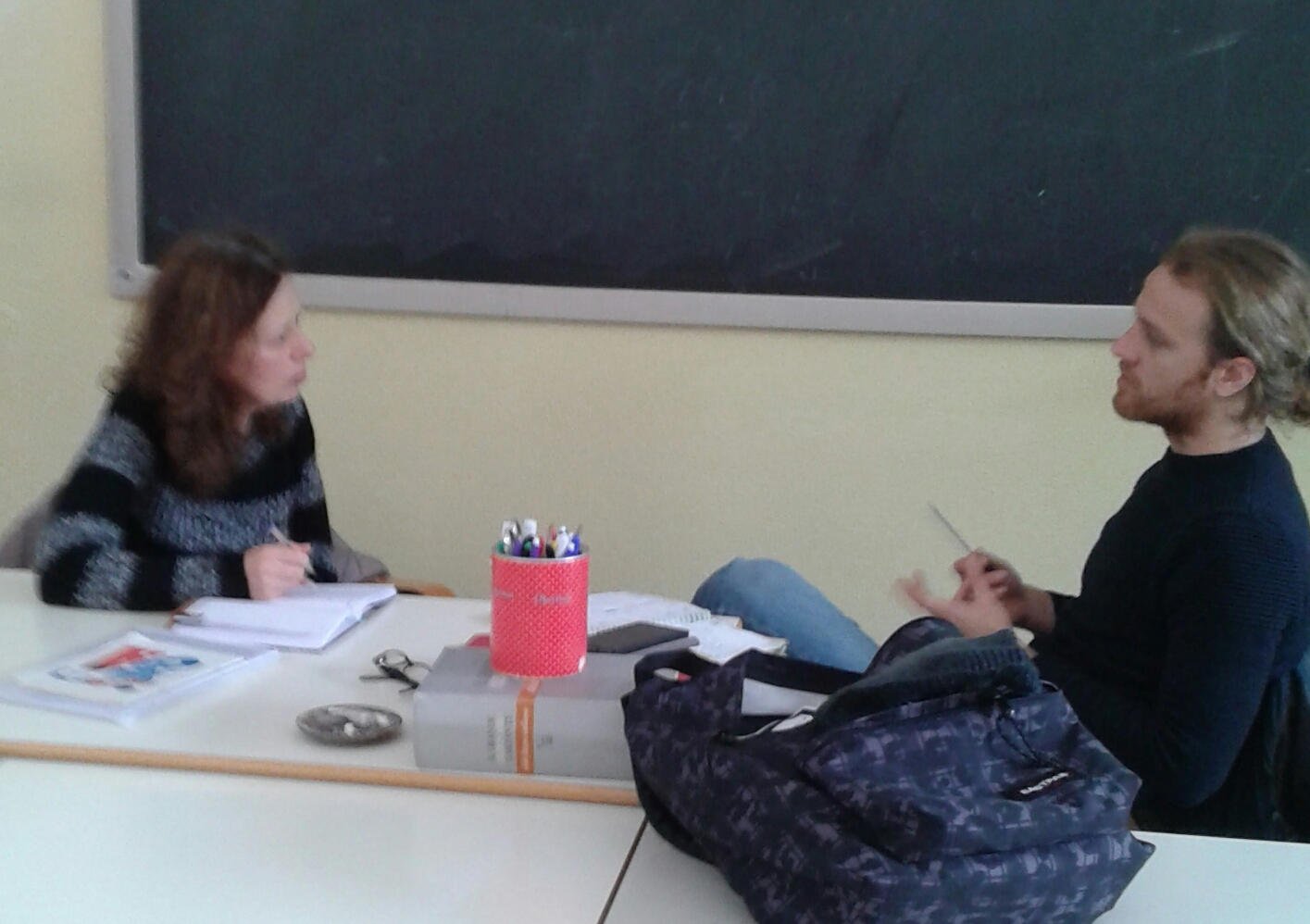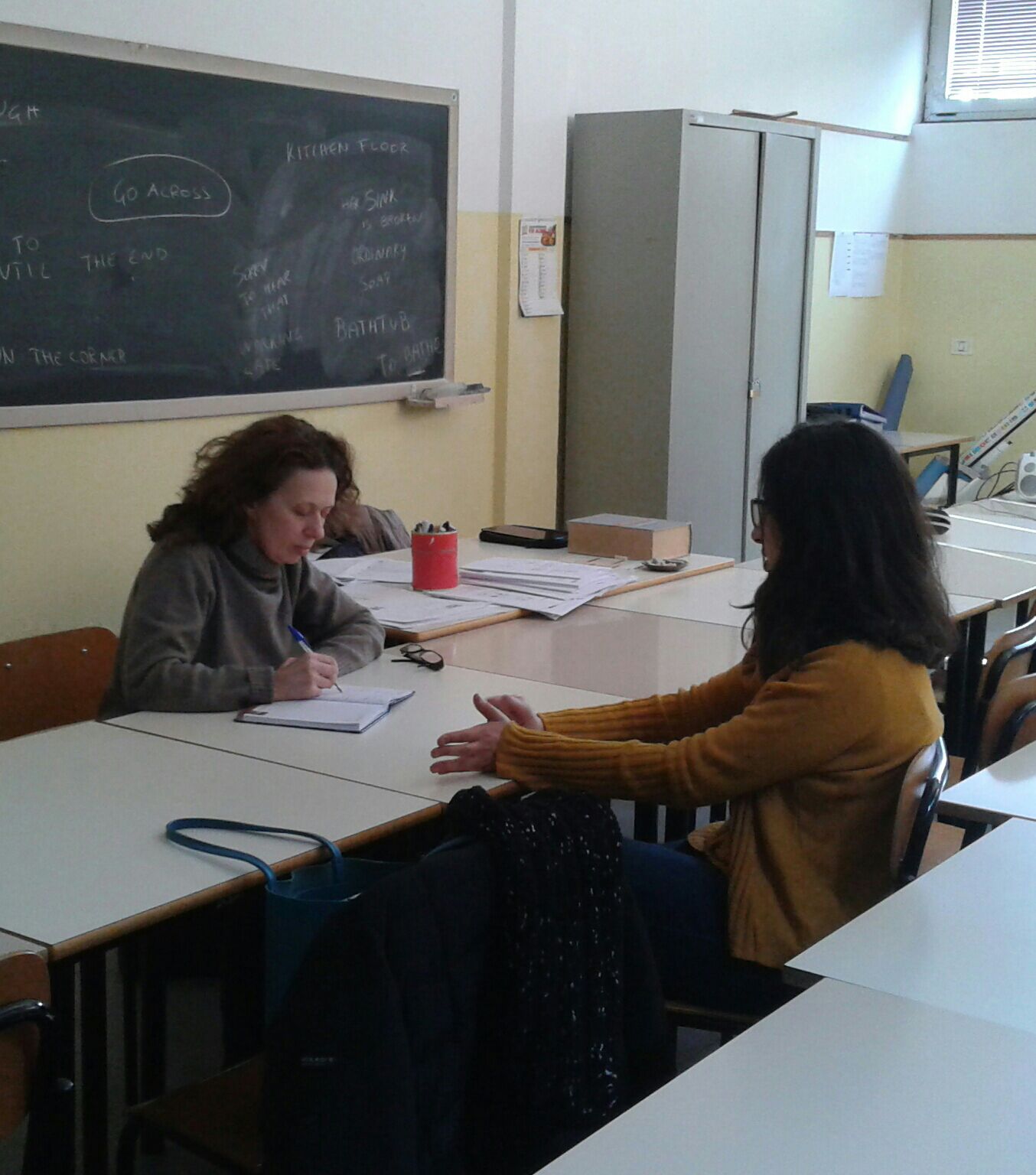Name of the activity
TALKS WITH NGO OPERATORS
Participants
English language teacher: Monica Moreschi
NGO operators:
Cooperativa Sociale K-Pax Onlus http://www.k-pax.eu/
Associazione per l'Ambasciata della Democrazia Locale a Zavidovici Onlus - Impresa Sociale http://www.adl-zavidovici.eu/
Società Cooperativa Sociale Onlus Il Mosaico http://www.coopmosaico.com/leggi_articolo.php?id=18
Asilo Notturno Fatebenefratelli Onlus http://www.fatebenefratelliasilonotturno.eu/
Società Cooperativa Sociale Onlus Ekopra
Società Cooperativa Sociale Onlus Kemay


Objectives
- Collecting information on how NGOs help asylum seekers and refugees satisfy their needs, and obtaining specific information about asylum
seekers' primary needs in relation to their linguistic and cultural integration
- Arranging future collaboration with NGOs to carry out sensitization activities and to disseminate the project activities
Description
The talks with NGO operators took place at two of our school centres where the English language teacher had the opportunity to meet operators
from different non-profit organizations on different dates. The purpose was to collect information from each NGO separately, and to examine all
the information collected later on.
The NGOs involved in the talks operate in the town and the province of Brescia and they manage CAS and/or SPRAR structures.
CAS stands for Emergency Reception Centres, which are first reception centres where asylum seekers and migrants are placed upon their arrival.
Second reception is mainly provided by SPRAR structures. SPRAR stands for Protection System for Refugees and Asylum Seekers.
According to reception guidelines, NGOs provide asylum seekers and refugees with accommodation and meals, as well as with legal and social
assistance, and a personalized programme to integrate them into Italian society. NGOs receive 35 euros a day for each asylum seeker, and their
activities and expenses are regularly checked and monitored in the SPRAR structures, due to the fact that these centres are the result of an
agreement between the Ministry of the Interior and the local authorities, which ask the third sector organizations to provide the requested
service. As for the CAS, even if they have to follow the same guidelines, their work is not monitored, probably because the municipalities are not
involved in the agreement, which is between the Prefecture and the private body providing the service required.
The NGOs we have contacted are all well organized. Most of them provide accommodation in small flats housing 3/8 people, and their operators
provide asylum seekers and refugees with different assistance and integration services, such as guidance on how to get access to the national
health services, psychological support, support to carry out the necessary operations to define their legal position, planning of Italian language
courses and vocational training courses, as well as activities aimed at integrating them into the local community through voluntary work and
entertainment (drama, music, painting, sport).
Also the NGO in charge of a big CAS, consisting of two structures (each of them housing 130 people) provide asylum seekers with a full range of
activities, including cooking courses, vegetable farming, carpentry, music and art workshops, football tournaments. Asylum seekers are also
involved in everyday chores, such as cleaning, cooking, tidying, loading and unloading activities, wall painting. Most of the people stay at CAS for
a short period of time (two weeks-two months), then they are transferred to a second reception centre. The others stay at the centre until their
legal position is finally defined.
Most of the NGOs involved in the talks complained about problems due to the fact that asylum seekers do not have a proper fiscal code: they are
given a code consisting of 11 numbers, about six moths after their arrival (after the presentation of the request for the international protection),
but this code cannot be used for enrolment in vocational training courses or for employment, because the code required to get access to them is
an alphanumeric code consisting of 8 letters and 7 numbers.
Only one of the NGOs involved in the talks managed to obtain asylum seekers' enrolment in courses offered by a VET centre, which also provided
the students with a final certificate issued by the Region of Lombardy.
In addition to this, the code consisting of 11 numbers allows asylum seekers to get access to health services, but they cannot have their own
General Practitioner.
Therefore, only refugees can generally enrol in vocational training courses, included those offered free by the Lombardy Region, and have the
opportunity to find a job. Refugees usually obtain their fiscal code after the Territorial Commission has accepted their application, namely about
14 months after the migrants' arrival.
As for asylum seekers, they can only be involved in volunteering activities or attend Italian language courses or lower secondary school courses
offered by CPIA centres, in addition to the courses organized by the NGOs.
Asylum seekers and refugees staying at CAS and SPRAR centres managed by the NGOs involved in the talks are from Nigeria, Senegal, Mali,
Gambia, Guinea-Bissau, Cote d'Ivoire, Pakistan, Afghanistan, Bangladesh, Eritrea and Somalia.
Some of the NGOs take care of men only, whereas in others centres there are also women and children.
As for the linguistic and cultural competences asylum seekers and refugees need to possess in order to integrate into our society, the NGOs
highlighted some situations that we should focus on when we plan our video based units:
- giving information about their status as asylum seekers or refugees
- understanding simple instructions (daily chores)
- looking for a job
- at the doctor's/at the hospital
- at the supermarket
- at the train station
- at the local authority offices
- Italian national festivals
Evaluation
The talks have been useful, because:
- they have provided us with precious information that can be used both in the awareness campaign and in the video based units we will create
later on;
- thanks to them, we will be able to involve the NGOs in the future dissemination of the project activities.
Dissemination
http://www.cpia1brescia.gov.it/wordpress/erasmus/
https://www.facebook.com/IEMRI/